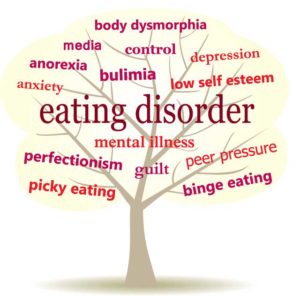
Homeopathy can help with the symptoms of anorexia and bulimia including the emotional and physical symptoms. Eating disorders such as anorexia and bulimia must be treated under the supervision of a qualified homeopath.
Background: Homeopathy seeks to treat holistically. The role of homeopathy for treating binge eating however remains poorly explored.
Objective: To determine the efficacy of individualized homeopathic treatment on binge eating.
Method: This was a nine-week pilot study using a case study design. Individualized homeopathic remedies were prescribed to each participant for six weeks and case analysis evaluated changes over time.
Results: All participants reported a decrease in the severity and frequency of binging behaviour; concurrent improvements in general health were also noted.
Conclusion: This pilot study shows the potential benefits of individualized homeopathic treatment in binge eating in males.
Discusses differences between homeopathy, which matches treatment with symptoms, and conventional medicine (allopathy), which seeks to suppress symptoms. Parallels between the 2 approaches are also discussed. Homeopathy has particular relevance for psychiatrists, in the face of mounting public outcry over involuntary hospitalization, electroconvulsive therapy, and deletrious effects of medication, which may lead patients to alternative modes of health care. The authors present 3 case histories of anorexia nervosa, anxiety neurosis, and manic depression that were successfully treated with homeopathy, as well as examples of larger case series. For homeopathic treatment, there exists the same sort of clinical evidence that supports many conventional interventions that have never been subjected to stringent testing. Homeopathy continues in active practice, has a long tradition of research, and may even be growing in its use in the US and other countries. It is concluded that allopaths need (1) an awareness of alternative modalities (i.e., homeopathy) that their patients may seek and (2) to apply scientific principles in assessing claims for efficacy of such alternatives. (30 ref) (PsycINFO Database Record (c) 2016 APA, all rights reserved)
Homeopathy for Bulimia: 2 Cases by Tamara Der-Ohanian
Her handshake was flaccid, and she struck me as being sweet, shy and anxious. She was an emaciated 27 year-old mother of an eight- month-old baby. Five months into her pregnancy, Ava started to feel disgusted with her body, saying she was “too fat”. Despite continuous reassurance from her husband about how beautiful she looked, Ava became consumed with her body image and started watching everything she ate. On days when she couldn’t control her food intake, she used laxatives to purge herself. By the time she was six months pregnant, she was exercising several hours every day. Ava had gained a total of eight pounds during her entire pregnancy.
After giving birth to a healthy baby boy, she became depressed and continued her obsessive exercise routine, coupled with starving herself and using laxatives. She had trouble falling asleep and considered herself “lucky” to get four consecutive hours of sleep. She found it stressful looking after the baby in her exhausted state and often felt like “giving up and running away.” The impetus to change her behaviour emerged when Ava’s husband threatened to divorce her and seek custody of their son. On the recommendation of family members, Ava started to see a psychologist who subsequently recommended that she try homeopathy.
Ava conversed with me while staring out the window, avoiding eye contact. Growing up in a dysfunctional home, she had survived psychological abuse from an alcoholic father and the neglect of a severely depressed mother. She helped raise herself and felt like her parents’ caretaker. Despite these adversities, she graduated from high school and went to college to pursue her love of fashion design. In college, she met her husband and they quickly became a couple.
It was shortly after getting married that her problems began. Ava developed social anxiety. Gradually, she stopped going out and socializing with friends. She experienced episodes of depression and withdrawal, alternating with anger and lashing out at her husband. In an attempt to gain control over her situation, she started dieting and going to the gym for a few hours every day. Then came the unplanned pregnancy, which propelled her eating disorder and obsessive exercise routines to new heights.
After an indepth case-taking, it became apparent that the homeopathic remedy Mercurius solubilis was suited to Ava’s emotional nature, compulsive tendencies, physical ailments, sleep complaints, feelings of isolation, and many other characteristics. Within two months of taking this remedy, Ava happily reported she was feeling calmer, sleeping better, and was less obsessed with dieting and exercising.
“I feel like a new person,” Ava said after six months of treatment. She was happier and felt more self-confident. For the first time in her life, she admitted to feeling compassion towards her parents, rather than the familiar anger, resentment, and blame.
Twelve-Year-Old with Bulimia
In many cases of eating disorders, people have trauma or neglect somewhere in their past as the triggering cause. Other cases of eating disorders are not so clear-cut.
Olivia’s parents received a call from school, informing them their daughter had fainted and had been rushed to hospital. She was discharged after some routine tests, with the recommendation that she see an eating disorders specialist. Her parents took her to the family doctor who referred her to a treatment centre, where she was diagnosed with Bulimia Nervosa and prescribed anti-anxiety medication.
Olivia’s parents were disheartened. Their biggest question was, “Why”? Olivia came from a stable, loving home. She was raised by a stay-at-home mom, was popular at school, got relatively good grades, and had no weight problems. While they noticed that she was losing weight, they attributed it to hormonal changes and growth. They were oblivious to the fact that Olivia was vomiting and using laxatives to purge herself several times each day.
During the homeopathic interview, I learned about Olivia’s perfectionistic tendencies. She had a restless nature and was driven to do everything perfectly. Her room was always tidy and organized, and her homework was done ahead of time. This need for perfection also included having a perfect physical appearance, like the supermodels in magazines. Olivia’s insecurity, and her need for order and perfection (among other characteristics), pointed to the remedy Arsenicum album.
Within three months of taking this remedy, Olivia felt calmer and happier with herself. She was no longer obsessed with becoming thin and she had stopped the binge-eating and purging behaviour.
